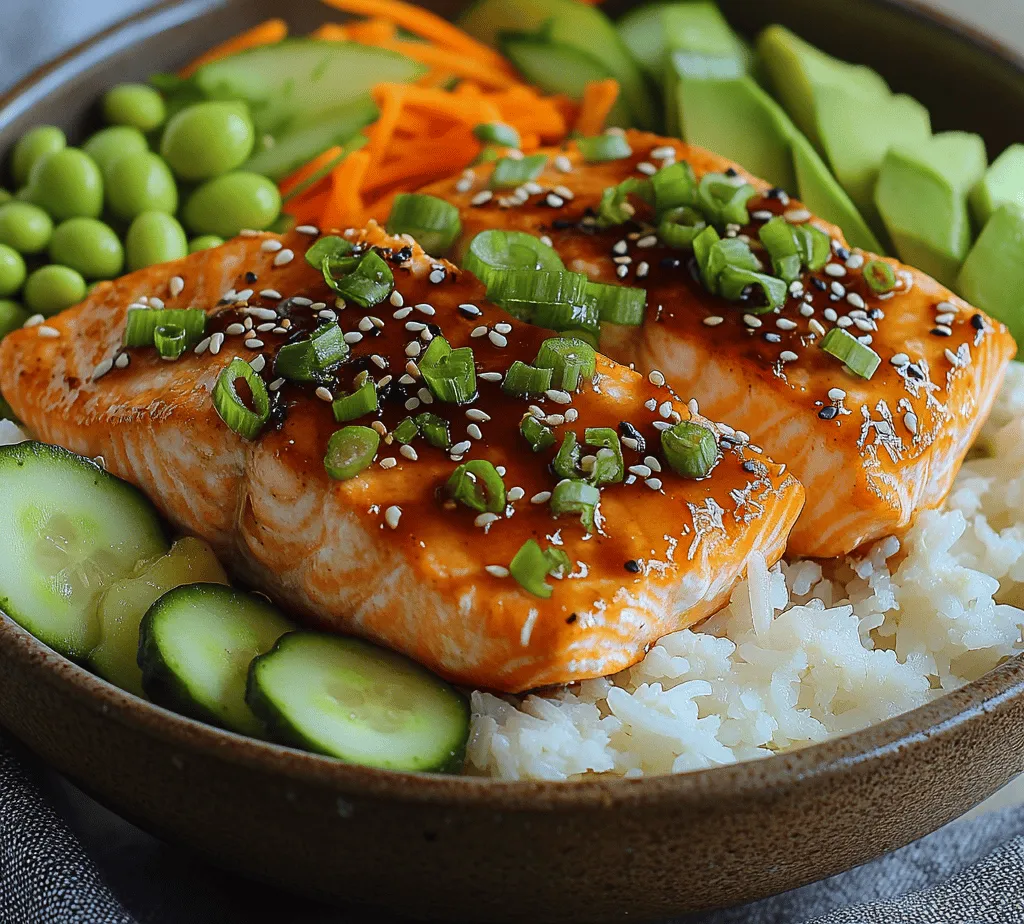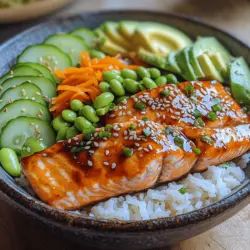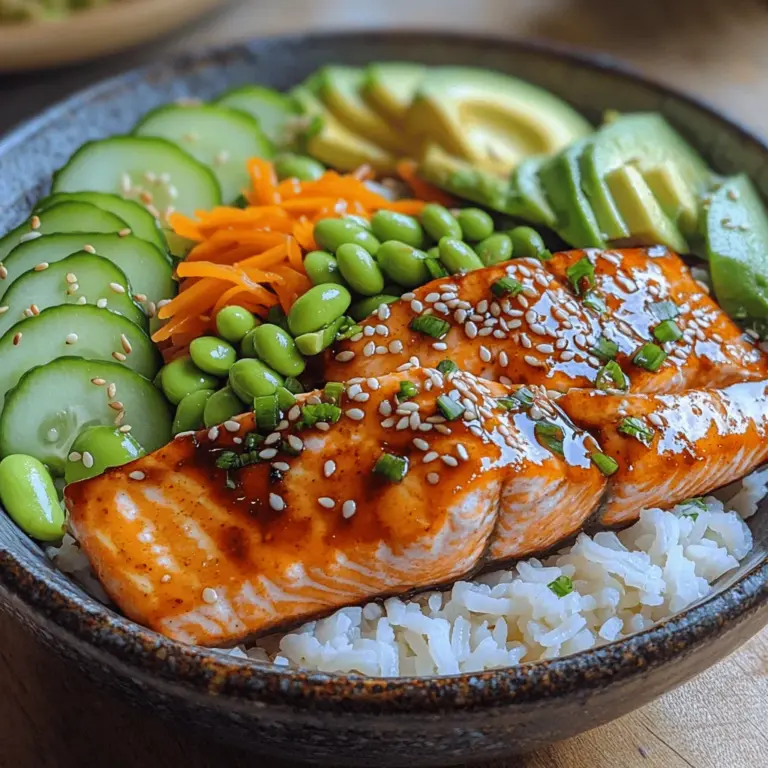Introduction
The Savory Teriyaki Glazed Salmon Bowl is more than just a meal; it is an experience that marries the rich, umami-packed flavors of Japanese cuisine with the vibrancy of fresh vegetables. This dish is crafted to not only tantalize your taste buds but also to provide a nutritious and wholesome option for lunch or dinner. With the heart of the dish being the succulent salmon fillet glazed in a homemade or store-bought teriyaki sauce, this bowl is a perfect blend of flavors and textures.
As our lives become increasingly busy, finding meals that are both quick to prepare and health-conscious becomes essential. The Savory Teriyaki Glazed Salmon Bowl checks all the boxes: it’s simple to make, incredibly satisfying, and packed with nutrients that support a healthy lifestyle. In this article, we will delve into the rich history and flavor profile of teriyaki sauce, explore the health benefits of salmon, and provide a detailed ingredient breakdown to guide you in creating this delicious bowl in your own kitchen.
Understanding Teriyaki Sauce
Origin and History of Teriyaki Sauce
Teriyaki sauce has its roots in Japan, where the word “teriyaki” refers to a cooking technique that involves grilling or broiling food and glazing it with a sweet soy sauce mixture. This method of cooking dates back to the 17th century, during the Edo period, when kabobs were popular. It was initially used for fish but has since expanded to include a variety of meats and vegetables. The traditional teriyaki sauce is a harmonious blend of soy sauce, mirin (a sweet rice wine), sake, and sugar, which together create a glaze that caramelizes beautifully when cooked.
As Japanese cuisine gained popularity around the world, teriyaki sauce evolved, incorporating local flavors and ingredients. Today, you can find a myriad of teriyaki sauces, each with its own unique twist, making it a versatile condiment that can elevate many dishes.
Ingredients that Make Teriyaki Sauce Special
The beauty of teriyaki sauce lies in its balance of sweetness and saltiness, achieved through its key ingredients. The primary components include:
– Soy Sauce: This forms the backbone of the sauce, imparting a rich, savory flavor.
– Mirin: Adds sweetness and depth, making the sauce complex while complementing the salty notes of soy sauce.
– Sake: This rice wine enhances the overall flavor and aroma, contributing to the dish’s authenticity.
– Sugar or Honey: Used to sweeten the sauce, promoting caramelization during cooking.
– Ginger and Garlic: These aromatics add warmth and depth, bringing an additional layer of flavor to the sauce.
These ingredients work together to create a glaze that not only enhances the salmon but also pairs wonderfully with the accompanying vegetables and rice.
Store-Bought vs. Homemade Teriyaki Sauce
While store-bought teriyaki sauces are convenient and widely available, many home cooks prefer to make their own for several reasons. Homemade teriyaki sauce allows for customization, letting you control the sweetness, saltiness, and flavor intensity. It also eliminates preservatives and artificial flavors often found in commercial products.
If you are short on time, a store-bought option can still work beautifully in this recipe. However, if you decide to go the homemade route, the following simple combination can help you whip up a fresh batch in just a few minutes:
1. In a saucepan, combine ½ cup soy sauce, ¼ cup mirin, 2 tablespoons sugar (or honey), and 1 tablespoon sake.
2. Bring to a simmer and stir until the sugar dissolves.
3. For added depth, incorporate minced garlic and ginger, adjusting to taste.
By making your own teriyaki sauce, you can tailor it to your palate, making it a delightful addition to your Savory Teriyaki Glazed Salmon Bowl.
The Nutritional Benefits of Salmon
Overview of Salmon as a Superfood
Salmon is often celebrated as a superfood, and for good reason. This fatty fish is not only delicious but also packed with nutrients essential for maintaining good health. Salmon is an excellent source of high-quality protein, which is vital for muscle repair and growth, making it a popular choice among fitness enthusiasts and health-conscious individuals alike.
In addition to being rich in protein, salmon is also loaded with important vitamins and minerals, including B vitamins, potassium, and selenium. These nutrients contribute to various bodily functions, including energy production, brain health, and immune function.
Omega-3 Fatty Acids and Their Health Benefits
One of the standout features of salmon is its high content of omega-3 fatty acids. These essential fats are known for their numerous health benefits, including:
– Heart Health: Omega-3 fatty acids have been shown to reduce inflammation, lower blood pressure, and decrease the risk of heart disease by improving cholesterol levels.
– Brain Function: Consuming omega-3s is linked to improved cognitive function and may help reduce the risk of Alzheimer’s disease and dementia.
– Joint Health: Omega-3s can help alleviate symptoms of arthritis and improve joint mobility due to their anti-inflammatory properties.
– Mental Health: Some studies suggest that omega-3 fatty acids may play a role in reducing symptoms of depression and anxiety.
Incorporating salmon into your diet, especially in the form of a teriyaki glazed bowl, is an excellent way to reap these benefits while enjoying a flavorful meal.
The Role of Salmon in a Balanced Diet
Including salmon in a balanced diet is highly beneficial. The American Heart Association recommends consuming fatty fish at least twice a week for optimal health benefits. In addition to being a source of lean protein, salmon provides essential fatty acids and nutrients that support overall well-being. Pairing it with whole grains like jasmine rice and colorful vegetables enhances the nutritional profile of the meal, making it a wholesome option for any time of day.
Ingredient Breakdown for the Teriyaki Glazed Salmon Bowl
Creating the perfect Savory Teriyaki Glazed Salmon Bowl involves selecting quality ingredients that complement each other beautifully. Below is a breakdown of the key components of this dish.
Salmon Fillets: Choosing the Right Type
When it comes to selecting salmon for your bowl, freshness is key. Look for bright, vibrant fillets with a moist appearance. There are various types of salmon available, including Atlantic, Sockeye, Coho, and King salmon, each offering a unique flavor profile and texture:
– Atlantic Salmon: Most commonly farmed, this variety is rich and buttery.
– Sockeye Salmon: Known for its deep red color and robust flavor, it tends to be leaner.
– Coho Salmon: Milder in flavor but still delish, Coho offers a good balance of fat.
– King Salmon: The most prized among chefs, it is rich, buttery, and has a high-fat content, making it incredibly flavorful.
When choosing salmon, consider sustainability as well. Look for seafood that is certified by organizations like the Marine Stewardship Council (MSC) or the Aquaculture Stewardship Council (ASC) to ensure you’re making an environmentally friendly choice.
Teriyaki Sauce: Flavor Profiles and Varieties
To achieve the best flavor in your teriyaki glazed salmon bowl, consider the type of teriyaki sauce you use. As previously discussed, you can opt for store-bought or homemade versions. The flavor profile can vary widely based on the ingredients used:
– Traditional Teriyaki Sauce: Sweet and savory, this is the classic choice that works well with salmon.
– Spicy Teriyaki Sauce: For those who prefer a kick, look for teriyaki sauces infused with chili or sriracha.
– Low-Sodium Teriyaki Sauce: A healthier alternative for those monitoring their sodium intake.
– Gluten-Free Teriyaki Sauce: Made with tamari instead of soy sauce, this option is perfect for gluten-sensitive individuals.
Choosing the right sauce can elevate your dish, so feel free to experiment with different varieties to find your favorite.
Jasmine Rice: Why It’s the Perfect Base
Jasmine rice is the perfect base for your teriyaki glazed salmon bowl due to its fragrant aroma and slightly sticky texture, which allows it to hold up well with the other ingredients. This long-grain rice is often used in Asian cuisine and pairs beautifully with the savory flavors of teriyaki.
Cooking jasmine rice is simple, requiring a 1:1.5 ratio of rice to water. Rinse the rice under cold water until it runs clear, then combine it with water in a pot, bring it to a boil, reduce the heat, and let it simmer until fluffy. The aromatic quality of jasmine rice enhances the overall eating experience, making each bite a delightful combination of flavors.
Edamame: Nutritional Powerhouse in Your Bowl
Edamame, or young soybeans, are a fantastic addition to your teriyaki salmon bowl. These little green gems are packed with protein, fiber, and essential vitamins and minerals, making them a powerhouse of nutrition. They are also rich in antioxidants and can help reduce the risk of chronic diseases.
To prepare edamame, simply steam or boil the pods for a few minutes until they are tender. Sprinkle with a bit of sea salt, and you’ll have a nutritious and tasty addition to your bowl.
Fresh Vegetables: Enhancing Flavor and Health
Incorporating a variety of fresh vegetables into your teriyaki glazed salmon bowl not only enhances its visual appeal but also boosts its nutritional value. Some great options include:
– Bell Peppers: Colorful and crunchy, they add sweetness and vibrant color.
– Carrots: Shredded or sliced, they provide a slight earthiness and crunch.
– Cucumbers: Fresh and cool, they balance the richness of the salmon and sauce.
– Broccoli or Snap Peas: Great for adding fiber and a satisfying crunch, they complement the dish nicely.
Feel free to mix and match according to your preferences and seasonal availability. The combination of textures and flavors will create a satisfying and well-rounded meal.
In the following sections, we will go through the detailed instructions to prepare the Savory Teriyaki Glazed Salmon Bowl, as well as tips for achieving the best results. Stay tuned to discover how to create this mouthwatering dish in your own kitchen!

Optional Garnishes: Adding Flair to Your Dish
Garnishes not only enhance the visual appeal of your Savory Teriyaki Glazed Salmon Bowl but also contribute additional flavors and textures that elevate the dish. Consider adding a sprinkle of sesame seeds for a nutty crunch or thinly sliced green onions for a fresh, oniony bite. Pickled ginger can provide a tangy contrast to the sweetness of the teriyaki glaze, while avocado slices add creaminess that balances the dish beautifully. Fresh cilantro or microgreens can also introduce a hint of herbaceous flavor, making your bowl look vibrant and inviting.
Step-by-Step Instructions for the Savory Teriyaki Glazed Salmon Bowl
Marinating the Salmon: Techniques for Maximum Flavor
1. Prepare the Marinade: In a bowl, combine soy sauce (or tamari for a gluten-free option), honey or maple syrup, minced garlic, grated ginger, and a splash of rice vinegar. This sweet and salty mixture will infuse the salmon with incredible flavor.
2. Marinate the Salmon: Place your salmon fillets in a shallow dish or a resealable plastic bag. Pour the marinade over the salmon, ensuring all surfaces are coated. Seal the bag or cover the dish with plastic wrap and refrigerate for at least 30 minutes, or up to 2 hours for a deeper flavor.
3. Bring to Room Temperature: Before cooking, remove the salmon from the refrigerator and let it sit for about 15 minutes at room temperature. This helps ensure even cooking.
Cooking the Salmon: Tips for Perfectly Glazed Fish
1. Preheat Your Cooking Surface: Whether you’re using a grill, stovetop skillet, or oven, make sure it is preheated. A hot cooking surface will help achieve that coveted caramelized glaze on your salmon.
2. Cook the Salmon: If grilling, place the salmon skin-side down on the grill and cook for about 4-5 minutes on each side, depending on thickness. For stovetop cooking, heat a tablespoon of oil in a skillet over medium-high heat and place the salmon fillets in the pan. Cook for about 4-5 minutes on the first side, then flip and brush with additional teriyaki sauce while cooking for another 3-4 minutes until the salmon is cooked through and flakes easily with a fork.
3. Baste for Extra Flavor: While cooking, periodically brush the salmon with the reserved marinade (make sure it’s cooked to eliminate any raw fish contamination) to deepen the glaze and intensify the flavors.
Preparing the Rice Bowl: Layering for Texture and Taste
1. Cook the Rice: Choose your preferred rice—jasmine, brown, or sushi rice work beautifully. Rinse the rice under cold water until the water runs clear, then cook according to package instructions. For added flavor, consider cooking the rice in vegetable or chicken broth instead of water.
2. Fluff the Rice: Once cooked, fluff the rice with a fork to separate the grains. This will make for a light and airy base in your bowl.
3. Layering the Bowl: In a large serving bowl, start with a generous layer of rice as the base. This will act as a canvas for the other ingredients.
Adding Toppings: Balancing Freshness with Flavor
1. Vegetable Choices: Choose a mix of cooked and fresh vegetables. Sautéed bok choy, steamed broccoli, or roasted edamame can add warmth while shredded carrots, cucumber ribbons, and sliced radishes introduce a refreshing crunch.
2. Protein Placement: Slice the glazed salmon into portions and arrange it neatly over the rice. The contrasting colors will make your bowl visually appealing.
3. Accentuate with Sauces: Drizzle additional teriyaki sauce over the salmon and rice for a burst of flavor. You can also offer a side of spicy mayo or sriracha for those who enjoy a kick.
Final Touches: Garnishing for Presentation
1. Garnish Generously: Finish your bowl with a sprinkle of sesame seeds and chopped green onions. Arrange any additional garnishes, such as avocado slices or pickled ginger, artistically around the salmon.
2. Visual Appeal: A well-garnished bowl not only looks professional but also invites your guests to dig in. Consider using contrasting colors to make the dish pop.
Exploring Variations and Substitutions
Alternative Proteins: Chicken, Tofu, or Shrimp
For those who may want to substitute the salmon, consider using chicken thighs marinated in the same teriyaki sauce for a different protein option. Tofu is an excellent choice for a vegetarian option—press it to remove excess moisture, then marinate and cook until golden. Shrimp can also be delicious when tossed in the marinade and grilled or sautéed until pink and tender.
Gluten-Free Options: Using Tamari or Coconut Aminos
If you are looking to avoid gluten, tamari is a great substitute for soy sauce, providing a similar flavor without gluten. Coconut aminos is another excellent alternative, offering a slightly sweeter taste and lower sodium content.
Vegetable Swaps: Seasonal Ingredients to Consider
Feel free to experiment with seasonal vegetables to keep your bowl fresh and exciting. Asparagus, zucchini, or bell peppers can be grilled or roasted to enhance their natural sweetness. Incorporating seasonal produce not only adds variety but also keeps your meals aligned with what’s locally available.
Creative Serving Suggestions: Bowl Inspiration
Get creative with how you serve your Savory Teriyaki Glazed Salmon Bowl. Use a mix of grains like quinoa or farro for a hearty base, or even spiralized vegetables like zucchini for a low-carb twist. You could also serve the components deconstructed on a platter, allowing everyone to customize their bowls according to their taste.
Serving Suggestions and Pairings
Complementary Side Dishes to Serve with the Bowl
To round out your meal, consider serving your teriyaki salmon bowl with complementary side dishes. A light miso soup or a simple seaweed salad can enhance the Asian flavors of the dish. Additionally, steamed dumplings or vegetable spring rolls can provide a delightful start to your meal.
Beverage Pairings: What Goes Well with Teriyaki Flavors
When it comes to beverages, light and refreshing drinks pair well with teriyaki flavors. Consider a chilled sake or a light lager beer. For non-alcoholic options, iced green tea or a citrus-infused sparkling water can cleanse the palate beautifully.
Making It a Meal Prep Favorite: Storing and Reheating Tips
This Savory Teriyaki Glazed Salmon Bowl is perfect for meal prepping. To store, separate the components: keep the salmon, rice, and vegetables in airtight containers. The cooked salmon can be refrigerated for up to three days. When reheating, do so gently in the microwave or on the stovetop to avoid drying out the fish. Assembling the bowl fresh each time will ensure optimal flavor and texture.
Conclusion
The Savory Teriyaki Glazed Salmon Bowl is not only a feast for the senses but also a versatile dish that can be adapted to suit various dietary preferences. Whether you are looking for a quick weeknight dinner or a healthy meal prep option, this bowl has it all. With its blend of flavors, textures, and nutritional benefits, it’s a recipe that deserves a spot in your regular meal rotation. Enjoy the process of making this dish and savor every bite of your creation!

